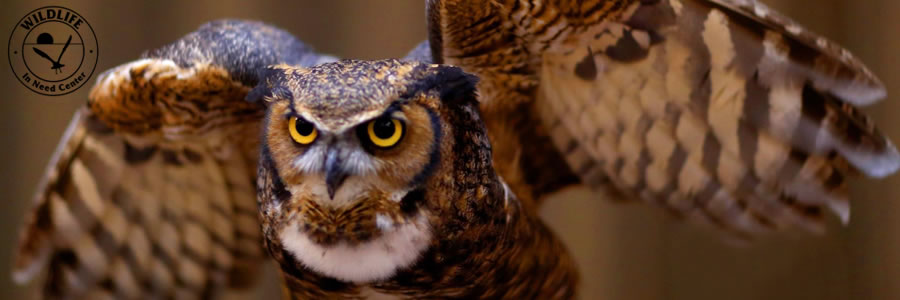Adult Bird
Adult Bird
Injured or sick adult birds can display a variety of symptoms that can include, but are not limited to:
Inability to fly, lack of balance, drooping wings, bleeding, fluffed out feathers or feathers covered in oil or unnatural sticky substances, slow response time to predators, or lying on the ground.
Window CollisionsIf it is known that the bird has hit either a window, house, or other solid object please drop a small towel over the bird, gently gather it up, and place the it in a small well ventilated cardboard box. Place the box with the bird in a warm, dark, quiet place for 1 to 2 hours. Then take the box outside and remove the lid. If the bird does not fly away please contact the Wildlife In Need Center or a licensed rehabilitator in your area with your observations to decide your next step in helping your sick or injured bird.
If you determine that the bird needs help please follow these suggestions for safe capture, care, and transportation.
Transporting an Adult Bird
Capture:Find a towel, blanket, or light weight material that will completely cover the bird. Also, find a well ventilated box or plastic pet carrier. Line it with an absorbent material like newspaper, paper towel, or a sheet. Please do not use towels or material with holes as the bird can get caught in it and further injure itself.
Remember that the bird sees you as a predator and will try to defend itself with its beak. It's a normal behavior so just BE CAREFUL!
• Approach the bird from behind and completely cover it with the material. Remember if the bird is alert it will struggle.
• Gently restrain the bird under the material and hold its wings against its body.
• Place the bird in your well ventilated cardboard box or plastic pet carrier.
Care:
Please DO NOT FEED or OFFER WATER to the bird as it can aspirate or choke on what is offered. Injured birds need to be rehydrated gradually and fed special foods and formulas so attempting to offer food and water can jeopardize the birds survival.
• Handle the bird as little as possible. Refrain from petting or holding the bird as it is extremely stressful and can contribute to the bird going into shock.
• Keep the bird in a dark, quiet, calm, and warm place to reduce stress until the bird can be brought to a licensed rehabilitation facility.
Transportation:
Place the covered and secured box on the floor or seat of your car. Keep the car quiet (no radio and quiet voices) and warm to reduce stress. Do NOT let a child or other individual hold the bird in transport. It is a safety risk for the person, as well as extremely stressful for the bird. Please think first about the well being of the bird in your care.
Remember your safety is the most important factor. Do not unnecessarily put yourself or others at risk for injury while attempting to rescue or capture an animal. The only thing that would hold a raptor in the wild is a predator about to kill it. When in doubt call the Wildlife In Need Center (262) 965-3090.
